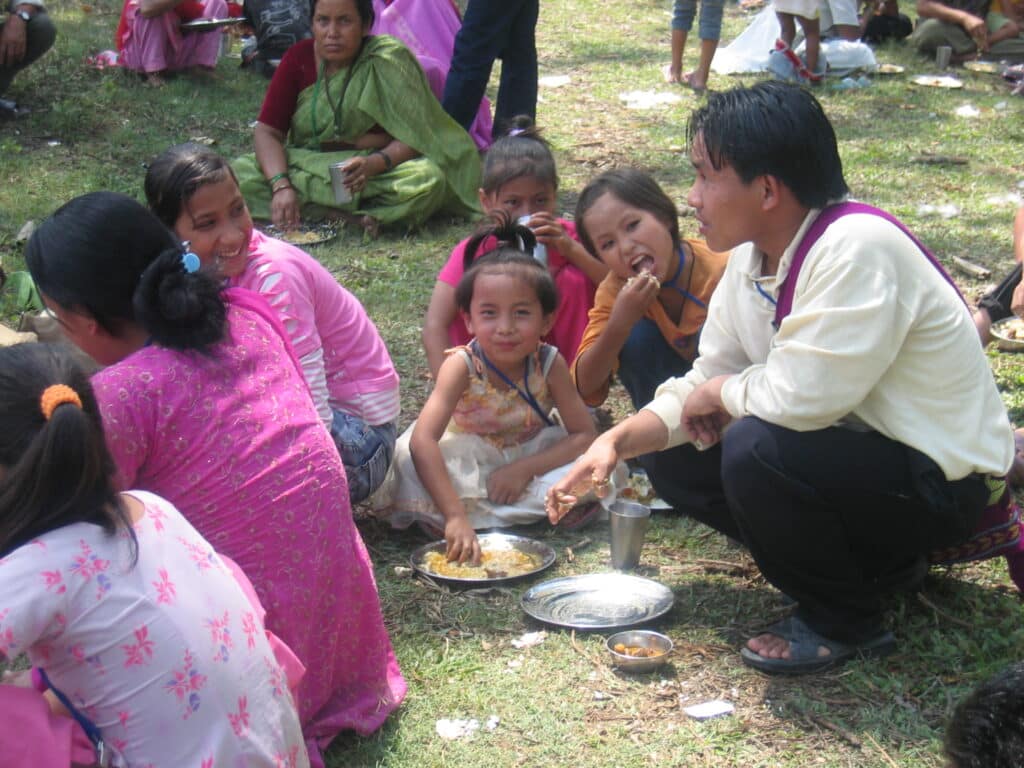Pray with Nepal, October 8, 2023
Lectionary Selection: Exodus 10:1-4, 7-9, 12-20

Prayers for Nepal
Gracious God, our father and mother, we come before you and do lift our brothers and sisters in Nepal. We give thanks to you for its beauty and resources. We are grateful to you for the quest for democracy and the strengthening of democratic institutions that are being pursued by significant sections of Nepalese society. Bless all organized efforts that seek the reduction of inequalities within Nepal and worldwide, and for ensuring all people live with dignity, peace, and equal opportunities. As we meditate upon the hardening of hearts of the ruling classes and castes, and the plagues they cause to rain upon peoples, we pray that wisdom and compassion be instilled in all those in leadership positions, so that they may pursue what is good and right for the wellbeing and blossoming of persons and communities. We commend the people of Nepal, and all of us, especially those groups and organizations that strive and struggle for justice and peace, to thy presence and guidance, so that all of us be renewed each day and pursue our causes without value judgments, malice, pride, or hardening of hearts. We ask all this in the name of our Lord, Savior, and liberator, Jesus Christ. Amen.
Mission Moment from Nepal
Nepal is a beautiful country nestled in the Himalayan mountains and is situated between India and China. The world’s highest mountain, Mount Everest, is on the border between Nepal and China. Tourism in Nepal is its most important industry and the major source of its revenue and foreign exchange. A monarchy ruled over Nepal for 240 years and it was abolished in 2008 and a new constitution was adopted in 2015. Since then, Nepal has been striving to be a Federal Democratic Republic.
Sharing borders and culture with India, Nepal is beset with similar issues and challenges posed by the caste system and caste-based discrimination. Poverty and marginalization go along with the caste-based privilege or disprivilege that is prevalent in most aspects of people’s lives in Nepal. Child labor is an issue that troubles Nepal despite much progress in the last couple of decades in reducing the number of cases. The reality of children facing exploitation and dangerous living conditions through child labor has been exacerbated due to the closures and restrictions around the COVID-19 pandemic.
Out of the total population of close to 30 million, more than 60% are young and the unemployment rate among this section of the population is significantly high. This causes many young people to migrate to India, the Arabian Gulf countries, and Europe and North America, in search of work and better living conditions. Nepal currently ranks 143rd on the Human Development Index among 191 countries, and the report identifies inequalities along gender, caste, and geographic regions as prime reasons for the lack or the loss of human development within its borders.
Samari Utthan Sewa (SUS) or Samaritan Upliftment Service, a social development organization in Nepal, established in 2008 by a group of Christian youth from the Dalit community, has worked with Global Ministries recently. SUS continues to work with the Dalit, poor, vulnerable, and other socially excluded segments of society, focusing on their basic needs and improving livelihoods. It also contributes to the process of empowering them to raise their voices for the cause of human rights, particularly Dalit rights. During the COVID-19 pandemic, SUS has responded by distributing WASH (Water, Sanitation, and Hygiene) items, and it continues to establish hand washing stations at strategic locations in Dalit and indigenous people populated areas. Likewise, SUS has researched “Vulnerability and Religious Minorities in Nepal,” as discrimination based on religious faith or belief is prevalent in Nepal, just as it poses an increasing challenge worldwide. Global Ministries have had an opportunity to partner in these initiatives of SUS.
Climate change and related devastation caused by heavy floods, soil erosion, and landslides, are adding sections of the population to the ranks of the impoverished who continue to face “multidimensional poverty” and undernourishment. The Asian Development Bank forecasts that Nepal could lose up to 2.2% of its annual GDP due to climate change by 2050. When we consider the fact that a vast majority of Nepal’s workforce is involved in small-scale and subsistence agriculture and that caste-based discrimination is more prevalent in rural areas, the future for the vulnerable sections of Nepal’s population could be grim unless there are significant changes to the social and political fabric and ethos of Nepal’s society.
Mission Partners in Nepal
